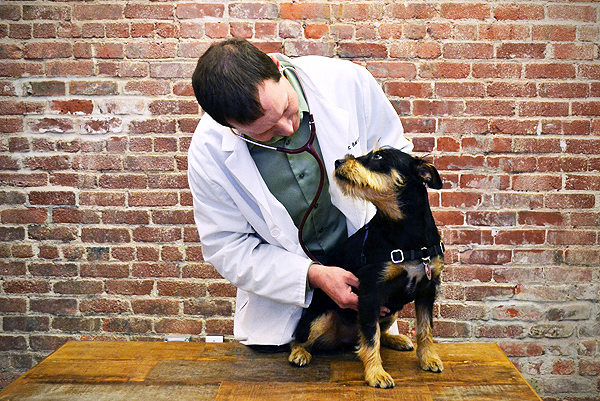In January, I wrote about a dog who swallowed a penny. The dog suffered a number of complications, including anemia, due to the toxicity of the penny’s zinc. Acute (sudden onset) anemia can occur as a complication of zinc toxicity.
However, zinc toxicity is not the only cause of acute anemia in dogs. There is another cause that is unfortunately relatively common — immune-mediated hemolytic anemia, or IMHA, a very serious condition.
IMHA occurs when a dog’s immune system becomes inappropriately overactive. This immune-system-gone-haywire then attacks red blood cells inside the body. As the red blood cells are destroyed, the body becomes deficient in them. Red blood cell deficiency is the definition of anemia.
Symptoms of IMHA
Dogs with IMHA may show several symptoms. Weakness, exercise intolerance, poor appetite, and lethargy are among the most common. Some dogs will become visibly jaundiced as the breakdown products of the red blood cells are released into the circulatory system. Other dogs might become visibly pale, with their tongue, gums, eyes, nose, and ears noticeably less colored than normal. Because red blood cells carry oxygen, some dogs may breathe with increased effort when anemic. The red blood cell breakdown products may cause discoloration of the urine. In fact, many owners of dogs with IMHA initially suspect that their pets have bladder infections because the urine may be so discolored that it appears bloody.
Causes of IMHA
There are two broad categories of IMHA. Primary IMHA is the most common form in dogs. In primary IMHA, no cause for the condition can be found. The immune system appears to go haywire on its own for no reason. Without doubt, there is a reason (or perhaps many reasons), but it has not yet been discovered.
Secondary IMHA occurs as an abnormal response to a known so-called antigenic stimulator, which causes the immune system to go haywire. Potential causes of secondary IMHA include tick-borne diseases, including Lyme disease, many different forms of cancer, and certain medical conditions such as pancreatitis or prostatitis. Numerous medications have been shown to be linked to IMHA, and a link has been surmised for almost every medication ever invented.
Remember that the above-mentioned antigenic stimulators are not the true cause of secondary IMHA. They may stimulate the immune system and therefore be the proximate cause of the condition, but the ultimate cause is an abnormal reaction by the immune system. The overwhelming majority of dogs who take medications do not develop IMHA as a response.
There appears to be a genetic component to IMHA, because certain breeds are predisposed to it. Breed predispositions exist for Cocker and Springer Spaniels, Bichon Frises, Collies, Miniature Pinschers, Poodles, and Old English Sheepdogs.

Do vaccines cause IMHA?
Vaccines are designed to stimulate the immune system, and it has therefore been surmised that they may trigger IMHA in dogs. Studies have shown that there may be a temporal correlation between vaccination and development of IMHA (in other words, dogs might be slightly more likely to develop IMHA within two months of vaccination). However, a causative link has not been established. Furthermore, there is no evidence that the overall rate of IMHA is higher in vaccinated dogs than in unvaccinated dogs. In this area, as with so many other aspects of vaccination, more research is needed.
Diagnosis of IMHA
IMHA often is diagnosed through a combination of physical exam findings and basic blood tests that show anemia and increased blood breakdown products. Certain special tests, including saline agglutination and Coombs’ testing, commonly are used to confirm the diagnosis. A complete battery of tests, including assessment for tick-borne disease and imaging of the chest and abdomen, often is run to assess for any potential cause for secondary IMHA. As mentioned above, in most cases no cause can be found.
Treatment of IMHA
Because IMHA is a condition caused by an inappropriately active immune system, the treatment for IMHA involves medications that attenuate the activity of the immune system. Steroids such as prednisolone are most commonly used, but other medications such as azathioprine or cyclosporine may also be included in treatment protocols. Dogs with secondary IMHA also undergo treatment for the underlying condition that triggered the syndrome or have the potentially culpable medication withdrawn.
Dogs with IMHA may develop life-threatening anemia, which may require blood transfusions. Cases of IMHA often require several days of hospitalization. Intravenous fluids often are administered to protect the kidneys from damage as the blood cell breakdown products are excreted. Severe cases may require advanced (and extraordinarily expensive) treatments with products called immunoglobluins.
In rare instances, surgical removal of the spleen is needed to control IMHA. This procedure can be effective in cases in which the spleen (which is a blood filtering organ) is heavily involved in the destruction of red blood cells.
Prognosis and long-term outlook for dogs with IMHA
I am sorry to say that the prognosis for dogs with IMHA is guarded, even with treatment. As mentioned above, dogs with IMHA may suffer from life-threatening anemia. Dogs with the condition also are predisposed to thromboembolic disease, in which blood clots compromise circulation to vital organs such as the lungs.
However, although the prognosis for dogs with IMHA is guarded, my personal experience has been that a majority of dogs with the condition survive when they receive appropriate treatment.
Dogs who survive acute IMHA crises generally require long-term and sometimes indefinite treatment with medications that attenuate the immune system’s function. Relapses are possible, but it has been my experience that they are rare when dogs survive initial crises and then receive appropriate long-term care.
Read more by Dr. Eric Barchas:
- Why Do Some Dogs Keep “Showing Their Lipsticks”?
- Let’s Talk About Dogs and Euthanasia: When Is It Time? Should You Be Present?
- 12 Dog Emergencies That Need Immediate Veterinary Attention
Got a question for Dr. Barchas? Ask our vet in the comments below and your topic might be featured in an upcoming column. (Note that if you have an emergency situation, please see your own vet immediately!)
Featured Image Credit: vchal, Shutterstock











